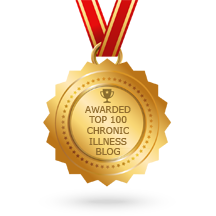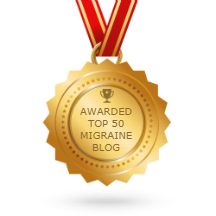Inspiring Migraineurs: Sara Long
After meeting so many amazing and inspiring people from Headache on the Hill and other people
that I've met along the way, I realized that I wanted to start a new part of my blog that is dedicated to people
who have inspired me. Sara and I became friends after working together at Headache on the Hill
2017, and right off the bat, I knew that we would be friends for a long time. She is one of the
most passionate, driven and optimistic people that I know. I hope you all enjoy this interview with
her!
1. Tell me a bit about yourself!
2. When did you first get diagnosed with migraines? What medications and tests have you been on and tried?
I was diagnosed with chronic migraines at 17 years old. I was first given Imitrex for my migraines. I did not take it for even a full year because the medication made me severely nauseous. Imitrex did not help my migraines at all, but rather made my migraines worse!The next medication I was put on was Topamax for a preventative migraine treatment. I also started receiving opioids to take for the pain during a migraine attack. I stayed on Topamax till 2016 and then started taking a beta-blocker and antidepressant for preventative treatment. I also tried the Botox treatments in 2015, but they did not work for me.I have also lost count of how many different holistic treatments I’ve tried. Simply put, they did not help my migraines.
3. What is it like being a graduate student with migraines?
To say it’s challenging would be an understatement. Grad school alone pushes people to the brink of their sanity and academic limitations, but simultaneously experiencing debilitating migraines, really complicates the process. Migraines and grad school is a recipe for disaster. Migraine paitents know that it’s best to establish a routine in your life to help prevent future migraine attacks (taking your medicine at the same time everyday, getting enough sleep, making sure to not go too long without eating, etc.). However, establishing and maintaining routines is almost impossible in grad school because you barely ever get enough sleep, sometimes forget to take your medicine because of a extremely hectic schedule, and so on… I deal with grad school and my migraines one day at a time because otherwise my life can get very overwhelming. As long as I continue to focus on the things that I can control in life, I know I will be able to graduate. I will also stay hopeful that migraines can be cured within m lifetime.
4. How do you cope with your migraines?
When I was first diagnosed with migraines I did not cope with them very well. I would get frustrated and sad, not only at the fact that I could not control or determine when a migraine would begin, but also with how difficult it was to describe to my friends and family how I was feeling. Throughout the past eight years, I’ve learned that being honest with people about how I am feeling during a migraine attack makes a huge difference in the help I receive from friends, family, and doctors. I have learned to not be ashamed when asking for help. I’ve also embraced counseling. I highly recommend it, to anyone, but especially patients with a chronic condition. Having a non-biased party to discuss your life with helps you learn to lead with logic, and not so much with emotion. I have also learned to forgive myself. People with migraines tend to put unrealistic expectations on themselves—I am definitely guilty of that. Learning to be kind to myself was the best thing I ever learned to do to help with migraines.
5. I was with you at Headache on the Hill 2017 and you were an amazing partner! What made you want to share your story and become a migraine advocate?
I wanted to be a part of HOH and advocate for myself and other migraine patients because the healthcare system made me very discouraged. For many years I felt like so many people did not take me seriously when I described to them how I felt during a migraine attack. Additionally, I thought that my doctors were only treating the systems of my migraines and were not attempting to discover the root cause of my migraine attacks.
6. What is one thing that you always have with you in case of a migraine?
Polarized Sunglasses. I drive a lot for work and bright headlights are painful to look at while driving. There are also fluorescent lights at my school and those can be extremely painful to look be around during a migraine attack. Sensitivity to light is one of my chief migraine symptoms, so much so that I get nauseous from too bright of lights when I’m having a migraine. I also have Pedialyte during a migraine attack. Not sure why it helps, but it does. Also, I recently bought the Migraine Hat on Amazon and it really helps!
7. What's a stigma (or stigmas) about migraines that you wish people knew the truth about?
I wish people would not confuse the terms “migraine” and “headache." The simplest way to describe the difference between the two would be that migraines are a neurological disorder and headaches derive from muscle tension. I also wish people understood that disability does not mean inability. Many people live with disabilities, but that does not mean that they can’t achieve their goals or live a normal life.
8. Lastly, do you have any words of advice for other migraine patients?
Definitely!
1) Be forgiving to yourself
2) Do not stress about the things you can not control
3) Advocate for yourself and your medical care
4)Take control of your healthcare plan
5) Question your doctors and do not be afraid to ask about their experience in treating migraines
6) Do not give up or lose hope—even though you may feel alone during a migraine attack and like no one understands the physical pain, THERE ARE people fighting for new research and advocating for your healthcare
7)Take a deep breath and allow yourself to rest
8)TALK about your migraines to those around you!—no one can help if you do not tell them how
9) Do not stress about how other people perceive you
As always, have an amazing, migraine-free week!





No matter the problems you end up facing, it's always better to keep pressing on with life. This gives you a sagacity of all you would need thus ascertaining that you eventually end up attaining what you are working towards. It's compelling what someone can do even when they are faced with serious problems which would require assistance.
ReplyDeleteCynthia Bowers @ Bay Area TMJ And Sleep